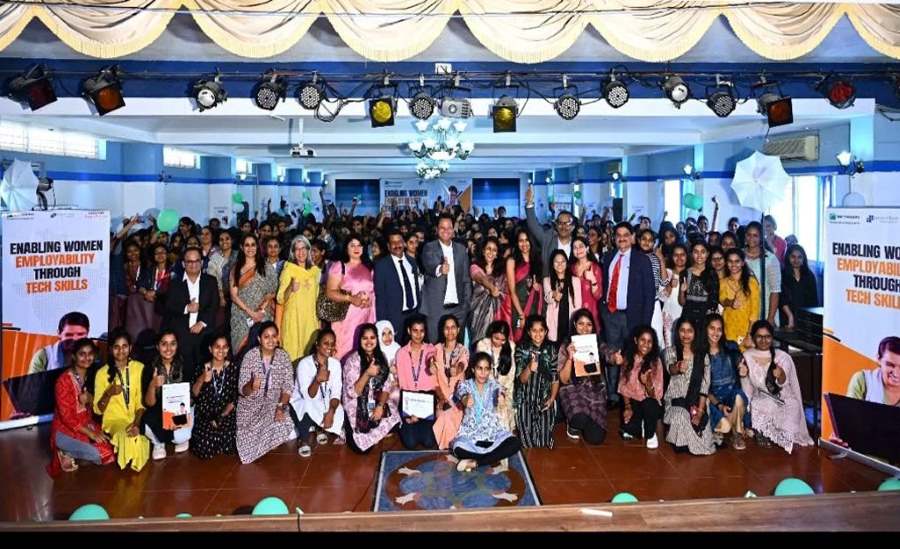
Nidhi Bhasin, CEO of Nasscom Foundation, and Manisha Khosla Sinha, Head of CSR, Brand and Communications at India BNP Paribas, spoke with CSR Times about how timely access to the right skills and opportunities can transform the lives of aspiring youth. They discussed how technology enables young individuals to pursue careers and create their own success stories.
Nasscom Foundation in collaboration with BNP Paribas skill 300 empowered marginalized women in emerging technologies
Q1. Can you please elucidate the program objective and how it has empowered the marginalized youth?
NB : The project aimed at empowering 300 marginalized young women through comprehensive training in emerging technologies. This includes 140 hours of instruction on the latest tech courses, plus an extra 60 hours focused on enhancing employability skills for better placement opportunities. Our primary objective is threefold: firstly, to increase the representation of women in the tech industry; secondly, to offer more opportunities for marginalized youth from tier 2 and 3 cities to uplift their livelihoods; and finally, to cultivate a competent workforce capable of managing and reducing the skill gap in the IT/ITeS sector. Through this holistic approach, we strive not only to equip these young women with valuable skills but also to facilitate their transition into self-employment or improved employment opportunities, thereby enhancing their overall quality of life.
Q2. What was the curriculum and training modules provided in the program to ensure that the beneficiaries are job-ready?
NB: The program was carefully designed with a comprehensive curriculum aimed at making beneficiaries job-ready upon completion. The training, delivered by skilled and experienced trainers, spanned over 200 hours and integrated both theoretical knowledge and practical applications to provide a well-rounded educational experience. The technical aspect of the curriculum covered 140 hours and included specialized courses including Python Programming for Artificial intelligence to equip the students with relevant and in-demand technical skills required in today’s job market. The focus was on imparting practical knowledge that the students could directly apply in a professional setting, ensuring they are well-prepared for technical roles. In addition to technical training, the program emphasized the importance of soft skills, which are crucial for workplace success. This included, financial literacy vital for their personal and professional lives, training in both verbal and written communication, assistance in resume building and interview preparation and finally modules on logical reasoning and other aptitude skills. The blend of these technical and soft skills training ensured that the beneficiaries not only acquired the necessary technical knowledge but also developed essential interpersonal and cognitive abilities.
Q3. How did the partnership with Nasscom foundation come about, and how has it evolved over time?
MKS: At BNP Paribas, until two years ago, our focus was on supporting educational interventions. However, we identified a significant gap in employability in formal sectors, encompassing both soft and hard skills. Further, there was a clear bias in lower employability of women. This was buttressed by statistics from reports like the one from a World Bank data that states that as of 2023, only 33% of Indian women are active in the labour market, compared to approximately 50% globally. And if you juxtapose this with surveys like a 2022 Pew poll that revealed that an alarming 80% of Indians believed that during job scarcity, preference should be given to men, we knew we had a challenge on our hands.
Now if you look at the digital sector, this issue gets further exacerbated. We grow up with this belief that technical jobs are only for men, but this is an idea that is gradually being deconstructed. Addressing this entrenched mindset is crucial not only for dismantling gender roles but also for driving growth in the Indian economy, where the GCCs are a key driver of formal employment. Our substantial presence in India as a bank and GCC, further helped shape our resolve to partner with Nasscom foundation. The programme assists women graduates in developing skills essential for employment, such as learning new tools like Python. The curriculum also focuses on nurturing soft skills to bolster confidence among individuals embarking on their careers. Looking ahead, we aim to double the number of beneficiaries and expand our training programs to encompass Tamil Nadu as well. We aspire to be part of an ecosystem that fosters greater diversity and equity in the digital sector.
Q4. What are the long-term goals and vision for BNP Paribas’ CSR initiatives, particularly in the areas of skilling?
MKS: BNP Paribas’ long-term vision for CSR initiatives, particularly in skilling, revolves around enabling communities to prosper by ensuring that the next generation of Indians can actively participate in and contribute to India’s progress. Our skilling efforts are aimed at equipping individuals with the necessary skills to thrive in the future job market, thereby enhancing their standard of living. We prioritize reaching out to groups that have been historically marginalized in the development journey, with a special emphasis on empowering women and addressing disparities among genders and ethnic groups.
While many corporate CSR initiatives tend to concentrate on prosperous states and major urban centers, BNP Paribas is committed to extending its programs beyond metros and tier 1 cities. By focusing on long-term impact and inclusivity, we aspire to contribute to a future where all individuals have the opportunity to thrive and contribute meaningfully to the nation’s growth and prosperity.



















